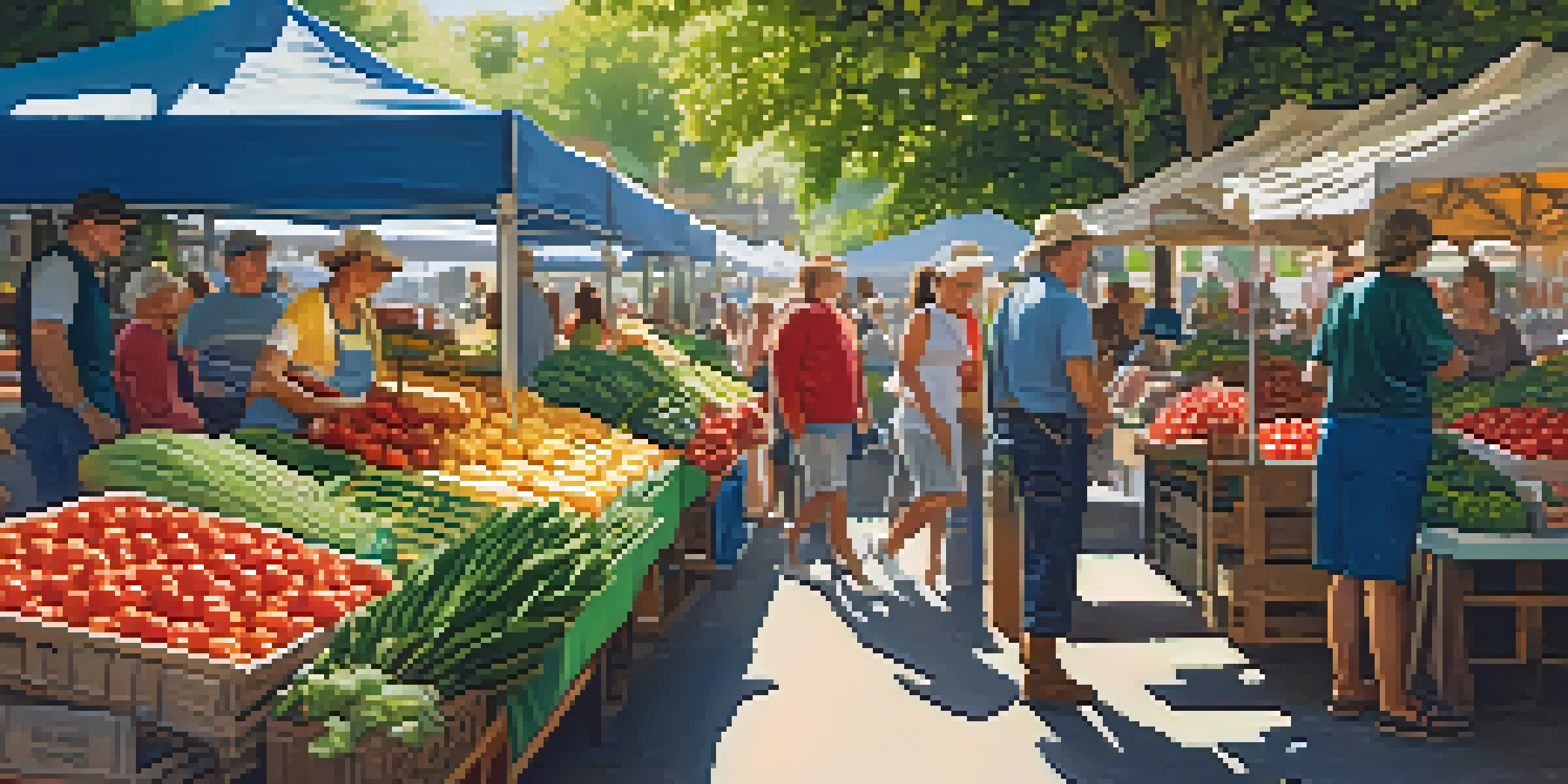The Importance of Local Sourcing in Vegetarian Cooking

Understanding Local Sourcing in Vegetarian Cooking
Local sourcing refers to the practice of obtaining ingredients from nearby farms or markets. This approach not only supports local economies but also promotes fresher produce. When it comes to vegetarian cooking, using locally sourced ingredients can elevate the flavors and nutritional value of your meals.
Eating locally means eating seasonally, and that means eating better.
Imagine biting into a ripe tomato that was picked a few hours ago versus one that traveled thousands of miles. The difference in taste and texture is profound. Local sourcing ensures that your vegetables are in season, bursting with flavor, and packed with nutrients that can degrade over time during transport.
Moreover, by choosing local options, you're often opting for organic and sustainable practices. Many local farmers prioritize eco-friendly techniques, which align perfectly with the values of many vegetarians and health-conscious individuals.
The Environmental Impact of Local Sourcing
One of the most compelling reasons to source ingredients locally is the positive effect on the environment. When food is grown nearby, less energy is consumed in transportation, which in turn reduces carbon emissions. For those who are environmentally conscious, this is a significant advantage.

Think about it: every time you choose a local vegetable over one shipped from afar, you're making a small but impactful choice for the planet. Supporting local farms helps preserve green spaces and reduces the need for large-scale agricultural operations that can harm ecosystems.
Local Sourcing Elevates Flavor
Using locally sourced ingredients enhances the taste and freshness of vegetarian dishes, making them more enjoyable.
In vegetarian cooking, utilizing local ingredients not only minimizes your carbon footprint but also encourages biodiversity. By embracing a variety of regional produce, you're supporting a more resilient food system that can adapt to changes in climate and market demands.
Supporting Local Economies Through Vegetarian Choices
When you buy local, you're directly supporting farmers and producers in your community. This not only helps them thrive but also strengthens the local economy. The money spent on local produce tends to circulate within the community, leading to job creation and economic stability.
The act of eating is a reciprocal relationship between the eater and the earth that sustains us.
For instance, consider how a small local farm can employ several workers, from field hands to market sellers. Each purchase you make helps sustain these jobs and the livelihood of your neighbors. This connection creates a sense of community that extends beyond just food.
Moreover, local sourcing fosters relationships between consumers and producers. Knowing where your food comes from can enhance your cooking experience and inspire you to try new recipes with seasonal ingredients.
Enhancing Flavor and Freshness in Vegetarian Dishes
Freshness is key in vegetarian cooking, and local sourcing is a surefire way to ensure your ingredients are at their peak. Freshly harvested vegetables tend to have a more vibrant flavor profile, which can elevate even the simplest of dishes. A local zucchini, for example, will taste far superior to one that has been shipped across the country.
Additionally, many local farms grow heirloom varieties that may not be available in larger supermarkets. These unique produce options can add diversity and excitement to your meals, allowing you to experiment with flavors and textures.
Support Local Economies
Buying local not only sustains farmers but also strengthens community economies and fosters job creation.
Using fresh, local ingredients can transform a basic salad into a gourmet experience. Imagine a salad made with just-picked greens, sun-ripened tomatoes, and a drizzle of locally made dressing—each bite will be a celebration of the season.
The Health Benefits of Eating Local Produce
Local sourcing can significantly benefit your health, as fresh produce retains more nutrients than those that have traveled long distances. When vegetables are harvested and consumed shortly afterward, they provide optimal nutrition, which is essential for a vegetarian diet.
Moreover, local farmers often use fewer chemicals and pesticides compared to larger agricultural operations. Knowing that your food is grown with care can provide peace of mind, especially for those committed to a healthy lifestyle.
By incorporating local ingredients into your vegetarian meals, you're not just making a culinary choice; you're investing in your health and well-being.
Building Community Connections Through Food
Buying local ingredients fosters a sense of community connection. Farmers' markets, for example, are not just places to shop; they are social hubs where people gather to share stories and recipes. Engaging with local producers can enrich your cooking experience.
When you know the people who grow your food, it creates a deeper appreciation for what goes into your meals. This connection can inspire you to try new cooking techniques or explore unfamiliar ingredients.
Health Benefits of Fresh Produce
Local produce retains more nutrients and often involves fewer chemicals, supporting a healthier vegetarian diet.
Community engagement through food can also lead to collaborative events, such as local cooking classes or farm-to-table dinners, where you can learn more about seasonal cooking and the importance of supporting local agriculture.
Practical Tips for Local Sourcing in Your Kitchen
To start incorporating local sourcing into your vegetarian cooking, consider visiting farmers' markets in your area. These markets offer a plethora of fresh produce, often at competitive prices, and provide a great opportunity to interact with farmers directly.
You can also join a Community Supported Agriculture (CSA) program, where you pay upfront for a share of a local farm's harvest. This not only supports farmers but also encourages you to experiment with seasonal produce you might not typically buy.

Lastly, don’t hesitate to reach out to local farms or co-ops to learn about their offerings. Many farms are eager to share recipes and cooking tips, enhancing your vegetarian cooking experience while supporting local agriculture.